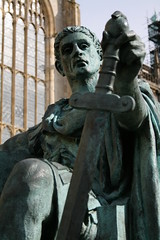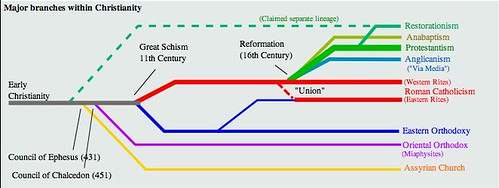The Abolition of the Clergy
This past Wednesday night, I had the pleasure and good fortune to attend John Gruel’s presentation “The Good Life: Vocation” at our church’s Wednesday night class offering time for adults. John used R. Paul Stevens’ book “The Other Six Days: Vocation, Work, and Ministry in Biblical Perspective” as the basis for his reflective lesson. According to John, Stevens had wanted to call his book “The Abolition of the Laity,” but John stated he thought a better title would be “The Abolition of the Clergy.” John is sharing a two-part series on this book. MY THOUGHTS AND REFLECTIONS HERE ARE IN ALL CAPS. EVERYTHING IN LOWER CASE IS A PARAPHRASE OF HIS POINTS FROM HIS TALK AND HANDOUT/NOTES.
This book is theologically in line with the “missional church” movement, which John has studied in his doctoral program with Fuller Theological Seminary and often teaches about in our Wednesday night classes for adults. In the message, John mentioned the world “Allelon,” which means:
All members of the people of God belong to one another, minister to one another, need one another and contribute to the rich unity and ministry of the whole.
A Google search for “Allelon” brought up the website Allelon.org. The mission of Allelon is:
…to educate and encourage the church to become a people among whom God can live, as sign, symbol, and foretaste of his redeeming love and grace in their neighborhoods and the whole of society- ordinary women and men endeavoring to participate in God’s mission to reclaim and restore the whole of creation and to bear witness to the world of a new way of being human.
I didn’t bring my laptop to this class session, so I took rather copious notes by hand on the paper handout which John provided those in attendance. (Class learning sessions like this would be perfect for using a Netbook with a reasonably large-sized keyboard, but I don’t have one yet.) I found this presentation and discussion to be both interesting and personally relevant, as I think it provides excellent guidelines for how we should view the Protestant Reformation as “not over” and understand our need to act as members of the Church universal in our daily lives. In his teachings, Jesus did not distinguish between laity and clergy. The hierarchical church structures which have existed historically and continue to be maintained in varying forms today are not an inheritance of Jesus’ teaching, but rather of the Roman influence on the early church after Christianity was accepted by Constantine I and later mandated (upon pain of death) by other Roman Caesars.

![]() photo credit: A Rickmann
photo credit: A Rickmann
Stevens’ thesis in his book and one to which John also ascribes is this: The Bible presents a theology of the people, for the people and by the people of God. Ordinary people should be able to understand “our” theology which is presented in the church. There are neither laypersons (laity) nor clergy in the New Testament, and it is potentially counterproductive to focus on the ministries and mission of the Church today as being carried out primarily by “the clergy” rather than by everyone who comprises the church throughout the world. This “us versus them” mentality is often counterproductive when members of the church as well as non-members look to formally ordained clergy to carry out acts of ministry rather than seeing us all as Jesus’ hands and feet empowered and equipped to do God’s work on earth.
This perspective does not discount or ignore the need for LEADERSHIP in the church, both historically and in today’s world, but does note that it was the Roman and worldly emphasis on hierarchy and position which brought the use and focus on “clergy” versus “layperson” roles in the church which we find commonly in virtually all Christian denominations today. The missional view is that we need to consider not only the life of the people gathered (ekklesia, or ‘the ones called out’) but also those dispersed in the world (diaspora) in the marketplace, government, professional offices, homes and schools.”
Unapplied theology is more speculative and theoretical. Missional theology seeks to be “beyond academic theology” and instead be practical and applicable, addressing REAL life issues everyday people can both understand and apply.
The New Testament vision of the people of God (laos) was and is ONE people comprised (miraculously) of Jews and Gentiles, men and women, rich and poor, slave and free, all being together as the chosen inheritance of God.
We must focus on right ways of LIVING and not just thinking
– we must strive for wisdom, and not merely knowledge
John has worked with others here in the Oklahoma medical community (he is a former orthopedic surgeon) to offer a “Spirituality in Medicine” course for both doctors and nurses
– so many “theological” issues and situations are faced regularly by medical professionals, yet many have not had any type of formal preparation to address and deal with these contexts
Our dependence on the clergy in the West traces back to the Dark Ages when monks preserved the church traditions
– in the Western church, traditional emphasis is VERY hierarchical
– the term “clergy” did not appear until the third century, and was simultaneous with the appearance of the word “laity”
– The Old Testament (OT) traditions were very hierarchical, established, and formal
– OT world: all the people were called to be God’s people, but only a few (prophets, priests, wise men, royalty) experienced a special call to leadership to God’s people
– in the NT world under the Lordship of Christ, formal leaders were universalized or abolished: the outpouring of the Spirit: the whole church becomes the new ministerium, a community of prophets, priests, royalty, serving God
The emergence of the Clergy arose largely because of three influences:
1- Imitation of the secular structures of the Greco-Roman world
— After Constantine, the Roman Empire permeated the Church rather than the Church permeating the Empire
2- Transference of the OT priesthood model to the leadership of the church (led to the role of priests and bishops, as well as the Pope in the Catholic church)
3- Popular piety elevated the Lord’s Supper to a mystery requiring priestly administration
— originally communion may have been more like a “potluck” experience
— eventually in some Catholic church traditions, the people were able to partake of the bread but only the priest was able to partake of the wine, it was reserved for him to do on behalf of the people who were not able/worthy to partake directly of it
— this model contrasts very sharply with the Jewish tradition of celebrating the Passover meal, which is delegated authority to the male head of each household
From the 4th to the 16th centuries the clergy-lay distinction deepened and become institutionalized
– clergy were (and still today are in many traditions) expected to vicariously “do ministry” on behalf of the church (for example, go visit people in the hospital)
– clerus meant “portion” (part of ministry)
– there wasn’t a Pope in Rome until Gregory in the 4th Century, when as the bishop of Rome he become the #1 church leader and it was asserted that his line went back to Peter who was “the first Pope”
I THINK IT IS SO RIDICULOUS THAT THE CATHOLIC CHURCH ATTEMPTED AND STILL ATTEMPTS TO PORTRAY THAT APOSTOLIC LINE OF PAPAL SUCCESSION BACK TO PETER, WHEN THAT IS NOT AT ALL WHAT THE DISCIPLES OF CHRIST ESTABLISHED OR WANTED TO ESTABLISH!
The Protestant Reformation was essentially incomplete in changing this model of a clergy-led church
St Jerome translated the NT into Latin in the 3rd Century, in the Eastern church they still used the Greek version for many years
In the NT the qualifications for leadership are all characteristics and gifts
Community is the only biblical way of relating leaders to the rest of the people: One God, One People
– One God: 3 persons
– One people, not two (clergy and laity)
– no individual members and no hierarchy of ministries
HOW SAD THAT AS FALLEN HUMANS, WE HAD TO IMPOSE THIS HIERARCHICAL VIEW AND PARADIGM ON THE CHURCH. THIS REMINDS ME OF SOME FEMINIST CRITIQUES OF PATRIARCHY I’VE READ IN THE PAST. IT ALSO MAKES THE ENTIRE SITUATION WITH “SAINTHOOD” SEEM RIDICULOUS AND HOPELESSLY COUNTERPRODUCTIVE IN TERMS OF THE REAL WORK OF THE CHURCH. ESTABLISHING SAINTS MAKES IT SEEM LIKE OUR ULTIMATE PURPOSE AS CHRISTIANS SHOULD BE TO STAND OUT AS INDIVIDUALS IN THE CHURCH AS THE PEOPLE WHO HAVE BEEN RECOGNIZED AS “SAINTS” DID, WHEN THE EXACT OPPOSITE IS TRUE: OUR ROLE IS TO SERVE AS MEMBERS OF THE CHURCH, LEADERS YET, BUT NOT LEADERS WHO WIN GLORY AND INDIVIDUAL RECOGNITION / ACCOLADES FOR ACCOMPLISHMENTS AND DEEDS.
We should be “one anothering” each other regularly in the Church
Celibacy was not a requirement for priests until the 6th century
In the Reformation, the priest was replaced by the pastor
– the sermon became emphasized over the sacrament of communion (in weekly services, as the purpose and focus of attending worship)
– the clothes of priests were replaced, when Reformed leaders become “pastors,” by the academic black gowns
A call is placed on all of us as Christians
– to belong to God: the call of discipleship
– to be God’s people in life: the call to holiness (to be set apart)
– to do God’s work: the call to service
The above are all “Christian vocations”
– personal / individual as well as corporate
Primary task of Adam and Eve before the fall: dwelling with and communing with God
1st thing in the book of Genesis that was not “good” – Adam being alone
In our world, work has become the defining experience of a person’s identity
THIS IS WHY IT IS SO IMPORTANT TO TRY AND AVOID ASKING SOMEONE, WHEN YOU FIRST MEET THEM, “SO WHAT DO YOU DO?” ASKING THAT QUESTION TENDS TO IMPLY THAT THEIR VALUE AND YOUR JUDGEMENT OF THEIR VALUE IS INHERENTLY TIED INTO THE WAY THEY PRESENTLY EARN A LIVING.
the nature of work today has become more amorphous
Human work is a blessing and a curse
– SO WERE THERE WEEDS BEFORE GENESIS 3?!
Jesus is depicted as a worker (tekton: someone who works with their hands to make things) – a carpenter or stone mason
While the NT has no place for clergy as a separate category of believer, there are many references to leaders within God’s people
– a basic question of church leadership is: Should leadership be considered a function or an office
– the traditional view is to make it an office: clergy
– John’s view is that leadership should be a function
Interestingly and troublingly, a minister in the Presbyterian church can’t be a member of the church
– instead, pastors are considered members of a presbytery
Homework:
1- Consider your home, neighborhood, and workplace as arenas for ministry exploring opportunities for discipleshiop, holiness and service in your everyday life
2- Think of the ways you distinguish between clergy and laity and examine them for validity
JOHN IS GOING TO CONTINUE THIS STUDY NEXT WEEK. I LOOK FORWARD TO IT! I THINK THE MISSIONAL FOCUS “IS” THE APPROPRIATE FOCUS WE SHOULD HAVE IN THE CHURCH TODAY, USING THE BIBLE AS OUR GUIDE.
Technorati Tags:
christian, christianity, missional, church, allelon, clergy, laity, history, reformation, neoreformation, abolition, leadership, emerging, congregation, people, edmond, oklahoma, presbyterian, denomination, lead

